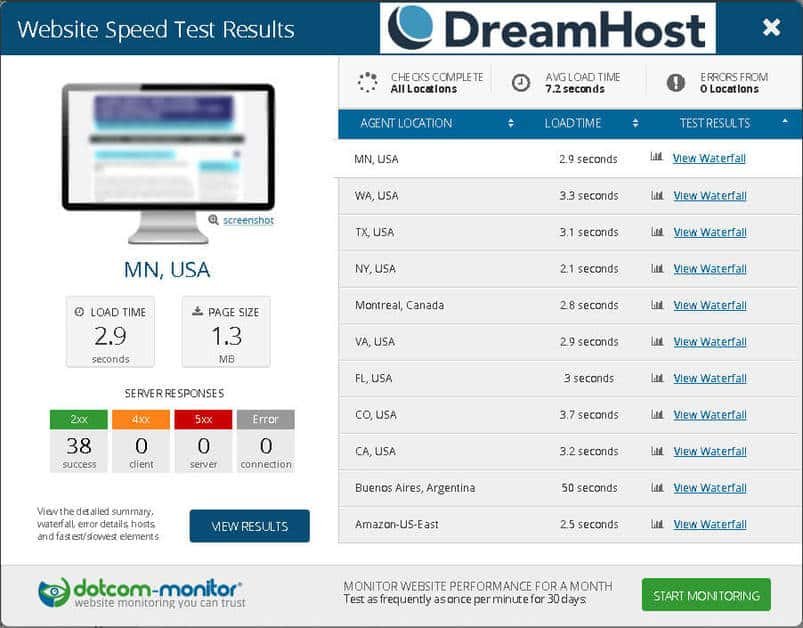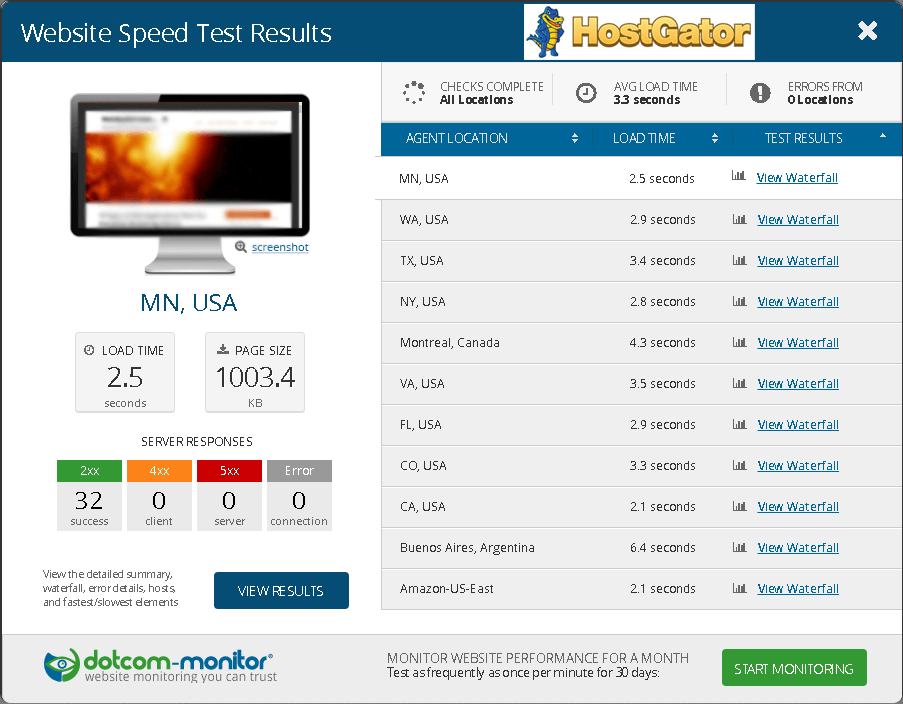I took each host and placed them against each other over the course of one year to answer that question and gathered a number of objective data on distance, server capacity, and other critical metrics. I’ve been creating and reviewing websites for over 10 years, using each host extensively, so I have a lot to say about each one (both good and bad).
DreamHost vs HostGator – Let’s find who is best in industry!
The aim of this page is to provide simple, factual (and subjective) DreamHost and HostGator information in order to help you decide the host is better for your circumstance. There’s no single best host for everyone, so it’s really about deciding what your requirements are and then looking at what functionality, availability, usability, efficiency, and more a host has to give. This page’s goal is to look at DreamHost vs HostGator’s problem and try to help you make an informed decision. Now that the introduction is over, let’s look at DreamHost and HostGator more closely to see which host comes out on top!
HostGator vs DreamHost: The Evaluation Criteria
It is important to have a standard set of criteria to make a fair comparison when making any type of comparison. I find that there are five key appraisal criteria I like to use that I always believe help to depict a web host’s equal and full portrait. The criteria used to compare and contrast HostGator and DreamHost are as follows: HostGator and DreamHost have been checked over a 12-month span using two WordPress test sites to get some really good data. The pages have the same apps, the same content, and the like. Although they are not similar, they are near enough for all the purposes of research.
Server Quality & Web Load Speed: HostGator vs DreamHost
One of a website’s most important features is page load speed, which is directly related to a web server’s speed and performance. If you have a bogged down server that operates slowly, you will find that loading your website takes a long time. On the other side, if you have a well-optimized application, you can normally have a quick loading website (assuming your platform is configured for speed as well). Remember, Sometime they might suspend your account if you fails to verify your details. Also, you will get hostgator verification suspended alert through email. Since pace and efficiency can also affect the way search engines view pages, making sure you have a website that loads quickly is now more than ever. I used free tools from the Dotcom-Monitor research resources platform, Dotcom-Tools.com, to run a full page speed test to test DreamHost and HostGator. Dotcom-Tools is good because from different locations and data centers you can see levels. I checked both pages from their American field that contains 11 different locations to keep things stable. The test results are shown in the examples below.
The DreamHost results will be shown above and the HostGator results will be shown below. On each server, each of these study domains was evaluated from all the North American data center locations of Dotcom-Monitor.
Looking at HostGator, in this study they’ve performed quite well. The site had an average load time of 3.3 seconds on their shared servers. When it comes to speed testing, it is considered the “golden rule” to get a website to load in less than 3 seconds and what most people should aim for. While the average time of HostGator was 3.3 seconds, the fastest time was 2.1 seconds (from the position of Florida, USA) and the slowest period was 6.4 seconds (from the location of Dotcom-Monitor in Argentina). Going on to DreamHost, their quickest loading period was 2.1 seconds (from the location of NY, USA) and their slowest loading time was 50 seconds (from the location of Argentina). That said, if you look across the board at the load times, in a variety of locations they were quite close to HostGator. During my own real-world research, I found that DreamHost’s servers tend to struggle relative to HostGator’s as pages get loaded with photos and become more complicated. Sometime, they might suspend your account if you fails to verify your details. Also, you will get hostgator verification suspended alert through email. The award for the speed and performance of the website: HostGator, by a small margin. Based at the objective data from this survey, it seems that DreamHost (although its score has been decreased quite a bit by the test place in Argentina) is quite similar to HostGator. However, under real-world conditions, this was not my personal experience with DreamHost overall. While in this study HostGator was relatively close to DreamHost, my website pace and efficiency experience with them was generally quite good, as they are usually one of the best to handle and leverage hosting resources in terms of mutual web hosts.
Uptime & Reliability: DreamHost Similar to HostGator
When it comes to your domain, downtime is always a bad thing whether you are a writer or a small business. Downtime can be very detrimental to the credibility of a blogger when they try to increase their following, and it can be very costly for a company as well. Trying to find a provider that has a good Service Level Agreement (SLA) that promises a high percentage of uptime is critical when searching for a web host. The industry standard, for starters, is 99.9%. It means that at least 99.9 percent of the time should be available for a web server to satisfy the SLA requirements. However, with that said, each host has its own SLA terminology and various meanings of uptime / downtime. These also often have specific criteria that need to be taken into account as failure and interruption. This is intended in many situations to shield a host from violence and sometimes to so-to-speak cover their backside. There are many hosts with more than equal management of uptime / downtime, however. DreamHost has a 100 percent SLA uptime, but only if an error happens and they will only reward you in that case when the failure arises. Therefore, if your website was down for 30 minutes, for example, DreamHost will give you 30 minutes of credit. HostGator has an SLA uptime of 99.9 percent, but if they slip below that at any stage in a month, they can give you credit for the whole month of service that is one of the strongest SLAs anywhere. To check uptime and downtime on both servers, I had two test sites (as mentioned earlier) that I tracked via Dotcom-Monitor’s service for 12 months at 3 hour intervals around the clock. HostGator (as reported on the Bluehost vs HostGator page and the GoDaddy vs HostGator article) had an incredible 100 percent uptime over 12 months. This was with 3 hour surveillance, as described on other reference sites, so that doesn’t imply there was no downtime, it just implies that no one was observed in 3 hour intervals. If the cycle had been tracking for 1 minute, I’m confident that in 12 months there would have been some downtime. DreamHost had a pretty good 98.4 percent uptime rate, which is the 12-month average, so some months may have been longer and some months may have been shorter. Nonetheless, an average of 98.4 percent is still pretty good, though it’s 100 percent below their SLA standard (which is still unrealistic).
So who succeeds in the area of uptime and reliability? HostGator.
It’s hard to beat uptime at 100 percent, no matter how you look at it, and that’s what HostGator had as reported by Dotcom-Monitor for 12 months straight. There’s no way something other than 100 percent will contest it, while DreamHost has had a strong estimation of uptime.
Customer Service— DreamHost & HostGator
Support is an essential component of any hosting kit. It can be extremely problematic if you have problems with your website and the host takes an extremely long time to address tickets or you have to wait forever on the talk.
A ticket system is the norm for hosting service, but many hosts provide more than that. Typically, premium hosts offer telephone, chat, email and ticket support 24/7/365. DreamHost provides support for speak, email and passes, but does not offer support for telephones. They’re saying users can ask for a call back from a support ticket, but I haven’t tried this— it’s clear, in my opinion, they’re trying to steer people away from that. HostGator has a web page where all their contact information is set out and even a toll-free number is given for telephone support. HostGator is definitely ahead here in terms of communication choices. I used the DreamHost ticketing system as well as their forum, and they seem to be pretty slow to address tickets and sometimes I’ve been waiting for a while on their talk. I can also say the same about HostGator, however. HostGator wasn’t used to be this way, as described on other sites on this blog, so I hope that in the future they will revert to their once amazing forms of promoting software.
Aid and utility winner: HostGator.
While both DreamHost and HostGator had faster ticket and chat response times, HostGator has more opportunities to reach them, such as telephone support, and their waiting times weren’t that lengthy, and DreamHost has always been as far back as I can remember. This is my view, of course, based on my experience so that somebody else might have gotten better service on one hand or the other, but I can claim that even with the long waiting times on each platform, I would have moved HostGator a little forward in terms of service and assistance.
User Interface / User Friendliness — HostGator vs DreamHost
It is really important when using a host to be able to easily navigate the backend panel of a web host and other areas of their admin panel. If you haven’t used cPanel yet, it’s the most popular online platform to administer shared Linux web servers, and that’s where DreamHost really fails because they don’t use it in this group.
I just hate to bash DreamHost here because they’re a solid company and web host, but in my experience their custom backend panel sucks totally. We don’t use cPanel (which is very user-friendly) and instead have this horrible, complex, home-brew backend panel which is incredibly confusing (at least to me). I absolutely hate it and fear anytime I need to go to a DreamHost account to move a website or make some changes because it’s really confusing and difficult to use. I don’t feel like their wiki / support docs are very detailed on top of that, so basically you’re left to explore their custom panel with terrible diagram. I can’t count the number of occasions I’ve had to hop on a DreamHost chat just to find out how to do something easy on your custom desk, so I guess I’m a power user when it comes to web servers and web hosting. HostGator, on the other side, utilizes cPanel, the industry standard, and their documentation of assistance is great. Knowing what you need is simple and convenient to use. A service like Bluehost is a little bit more more “noob-friendly,” but HostGator is very user-friendly if you have any hosting background at all. It’s really the first business I have ordered from professional web hosting. Bluehost also make your account suspended if your hosting as malware in it, bluehost malware removal as to be done asap to un suspend it.
The UI / UX / User-Friendliness winner: HostGator, and it’s not closer.
The custom panel of DreamHost really fails, and in my experience it’s their biggest downfall. Perhaps they can change it at some stage or use cPanel, but HostGator is the clear winner in this group until then.
DreamHost and Host Gator: Cost, Content, and Packages
Quality is a big web host shopping factor for most users. Shared hosting is a competitive marketplace with a lot of different possibilities. The only thing people really need to look out for is the retention prices because some hosts give a small promotional price and then they jack up rates at renewal time when the introductory period is over. In comparison, several various discounts can also be used to help lower the initial cost, rendering prices more complicated. We will ignore coupons in this section for the sake of keeping things simple. Both DreamHost and HostGator deliver on their hosting plans “infinite anything,” which is not unlimited, but is a topic for another tab. Essentially, if you abuse it or go too far, at some point they will cut you off. Nonetheless, they all offer unlimited access, communications, files, etc. for comparison purposes here.
DreamHost’s pricing is fairly simple, they charge $10.95/month if you choose to pay month to month, $9.95/month if you pay for an entire year, and $7.95/month if you pay for three years. I believe that their renewal pricing is the same as these as well, so there isn’t a surprise. This also includes unlimited domains as well. HostGator offers multiple plans, but they only allow one domain on their Hatchling plan which is their cheapest plan. However, this is only $3.45/month if you sign up for three years, which is a lot less than DreamHost if you’re only planning on hosting 1 domain. If you need to move up to unlimited domains, HostGator’s Baby plan offers that for $4.95/month if you pay for 3 years up front. One level up form that is HostGator’s Business plan which is $5.95/month if you pay for 3 years up front, and is probably the most similar to DreamHost’s plan but with a few extra features such as a free VOIP phone. When you look at all the different prices, HostGator comes out a bit ahead in terms of the annual and multi-year cost. Their pricing isn’t quite as straightforward as DreamHost, but when you do the math it’s a little better in my opinion.
Who wins on the pricing front: HostGator, by a little bit.
DreamHost isn’t a terrible value by any means, but they’re just a little bit less competitive than HostGator in my opinion.
Who Wins the Whole Contest? DreamHost or HostGator?
In my opinion: HostGator. Here’s why—when it comes to speed and performance, DreamHost did a little better according to the Dotcom-Monitor tests, but in almost every other category HostGator is ahead—especially in the user interface and uptime categories. I think HostGator just puts together a less expensive and more reliable package that is MUCH more user-friendly. And, in my personal experience (not from direct testing) their servers have been a little snappier than DreamHost.





